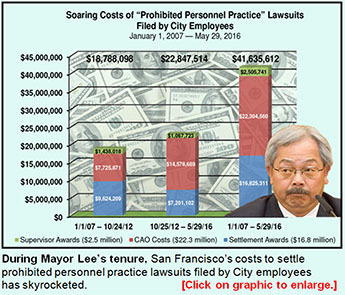 Westside Observer
Newspaper
Westside Observer
NewspaperJuly 2016 at www.WestsideObserver.com
Update on Civil Grand Jury Whistleblower Report
Bullying Costs Soar to $41.6 Million
Article in Press Printer-friendly PDF file
 Westside Observer
Newspaper
Westside Observer
Newspaper
July 2016 at www.WestsideObserver.com
Update
on Civil Grand Jury Whistleblower Report
Bullying Costs
Soar to $41.6 Million
by Patrick Monette-Shaw
Imagine being a public employee who lacks basic First Amendment protections to use free speech on matters of “public concern” guaranteed by the U.S. Supreme Court.
Thirteen years after voters passed Prop “C” in 2003 requiring the Board of Supervisors to enact adequate protections to curtail retaliation against City employees who file complaints involving improper government activity and matters of public concern, progress has inched forward over the past year — but just barely.
During the past year there’s been more “collateral damage” to City employees who faced bullying in one form or another in a whole host of prohibited personnel practices already proscribed by law.
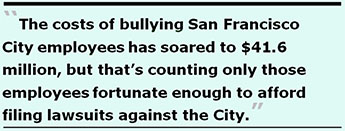 Since
2007, the costs of bullying San Francisco City employees has soared
to $41.6 million, but that’s counting only those employees
fortunate enough to afford filing lawsuits against the City. That
$41.6 million could have been better spent solving a myriad of
problems facing the City.
Since
2007, the costs of bullying San Francisco City employees has soared
to $41.6 million, but that’s counting only those employees
fortunate enough to afford filing lawsuits against the City. That
$41.6 million could have been better spent solving a myriad of
problems facing the City.
Costs of Retaliation Against City Employees Keeps Soaring
In May 2013, the Westside Observer carried my first article on the high costs of retaliation and bullying of City employees. In July 2015, I wrote an update on the subject in “Retaliators Keep Their City Jobs” for the Observer.
Dr. Derek Kerr — a former Senior Physician Specialist at Laguna Honda Hospital for over 20 years wrongfully terminated for his exposé of the raid of the hospital’s patient gift fund used for staff perks instead — first placed a records request with the City Attorney’s Office in October 2012 for records involving lawsuit settlements for a host of prohibited personnel practices. The first 103 cases involved $9.6 million in lawsuit settlements, and another $7.7 million for the costs of City Attorney time and expenses trying to stop the lawsuits.
 The
lawsuit settlement amounts paid by the City Attorney do not include
back pay awards or other amounts not processed through the City
Attorney. Checking Board of Supervisor’s agendas, six of
the 103 settlement received a total of an additional $1.4 million,
ostensibly for back pay or other awards, bringing the total to
$18.8 million for the first 103 cases that I reported on in 2013.
The
lawsuit settlement amounts paid by the City Attorney do not include
back pay awards or other amounts not processed through the City
Attorney. Checking Board of Supervisor’s agendas, six of
the 103 settlement received a total of an additional $1.4 million,
ostensibly for back pay or other awards, bringing the total to
$18.8 million for the first 103 cases that I reported on in 2013.
In my July 2015 article, the initial 103 cases settled prior to October 24, 2012 had climbed between October 2012 and May 2015 by an additional 123 cases to 226 cases that had been settled, plus 66 cases that then remained pending.
On May 29 of this year, I placed another records request for updated data on lawsuits settled between October 2012 and May 29, 2016. The number of cases settled in that period surged from 123 to 159, involving $7.2 million in settlements awarded, and a whopping $14.6 million costs in City Attorney time and expenses, for a total of $21.8 million, plus an additional $1 million awarded by the Board of Supervisors for back pay or other awards, pushing the total since October 2012 to $22.8 million, above and beyond the first 103 lawsuits.
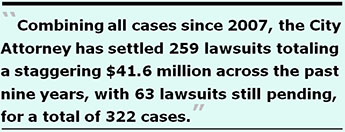 Combining
all cases settled since 2007, the City Attorney has settled 259
lawsuits totaling $16.8 million in settlement awards, plus $22.3
million in City Attorney time and expenses, plus $2.5 million
awarded by the Board of Supervisors for back pay or other awards,
bringing the costs across the past nine years to a staggering
$41.6 million, with now 63 lawsuits still pending, which will
likely fuel additional costs!
Combining
all cases settled since 2007, the City Attorney has settled 259
lawsuits totaling $16.8 million in settlement awards, plus $22.3
million in City Attorney time and expenses, plus $2.5 million
awarded by the Board of Supervisors for back pay or other awards,
bringing the costs across the past nine years to a staggering
$41.6 million, with now 63 lawsuits still pending, which will
likely fuel additional costs!
That there’s been 322 such lawsuits settled in the past nine years, shows the City clearly has a problem on its hands in not avoiding costs for 27 various categories of already-prohibited personnel practices on the law books.
Table 1 below shows that four of the 27 categories — Racial Discrimination, Disability Discrimination, Wrongful Termination, and “Other-Actions by Employees Against the City” — have accounted for 67% ($27.8 million) of the total costs for the 259 cases settled to date, including $8.6 million involving Racial Discrimination (40 cases), $6.6 million involving Disability Discrimination (46 cases), $6.4 million involving Wrongful Termination (41 cases), and $6.3 million involving Other Actions (45 cases).
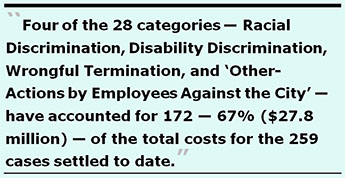 Together
they total 172 — 66.4%, fully two-thirds — of the 259
cases settled to date, but there are another 41 pending cases
spread across these four categories that will push the combined
total to 213 of the 322 cases filed to date between January 2007
and May 29, 2016.
Together
they total 172 — 66.4%, fully two-thirds — of the 259
cases settled to date, but there are another 41 pending cases
spread across these four categories that will push the combined
total to 213 of the 322 cases filed to date between January 2007
and May 29, 2016.
Of interest, of the $27.8 million in total costs for the four categories, the City Attorney Office’s (CAO) costs for time and expenses total $15.4 million — 69.1% — of the $22.3 million in CAO costs trying to stop all 259 cases settled to date, and $12.4 million was awarded to employees in these four categories — 64.5% — of the $19.3 million in total settlement awards (combining the CAO awards and Board of Supervisor awards).
Table 1 shows the cumulative total of lawsuits filed between 2007 and 2016, sorted by descending Total Amount.
Table 1: Prohibited Personnel Practice Lawsuits, 2007 – 2016, Filed by City Employees Against the City of San Francisco
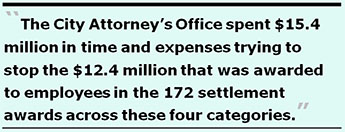 [Click
on Table for enlarged version.]
[Click
on Table for enlarged version.]
Of some concern is that many of the lawsuits filed by City employees are apparently classified by the CAO as a given type of complaint, but Superior Court records show the case to be something entirely different.
Of the 322 lawsuits filed since 2007, only one involved a claim
of First Amendment retaliation, in a lawsuit filed by a City employee,
Andrew Cohen v. Gavin Newsom et al., a case that was transferred
from San Francisco Superior Court to the U.S. District Court for
the Northern District of California at the City’s request.
Although the City Attorney’s Office had logged the case as
involving a First Amendment lawsuit, the Superior Court web site
showed that it was a Civil Rights lawsuit involving approximately
18 officers of the San Francisco Police Department over the “Cops
Gone Wild” video scandal in 2005 who had alleged “Racial
Discrimination,” not “Civil Rights” or the “First
Amendment.” The 18 officers asserted that everyone on the
video was suspended, except
Asian American SFPD officers. Why the City Attorney had not initially
recorded it as a Racial Discrimination case, instead of a First
Amendment case, isn’t known.
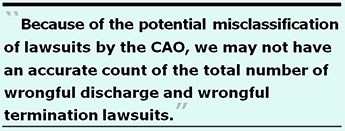 Cohen’s
case was dismissed in District Court in Newsom’s favor. That
means that to date, there has been not one actual First Amendment
retaliation lawsuit filed by City employees against the City,
in part because San Francisco’s Campaign and Government Conduct
Code §4.115(a) does not
currently contain anti-retaliation protections for City employees
who exercise their First Amendment free speech rights.
Cohen’s
case was dismissed in District Court in Newsom’s favor. That
means that to date, there has been not one actual First Amendment
retaliation lawsuit filed by City employees against the City,
in part because San Francisco’s Campaign and Government Conduct
Code §4.115(a) does not
currently contain anti-retaliation protections for City employees
who exercise their First Amendment free speech rights.
In addition to Andrew Cohen v. Gavin Newsom et al. lawsuit, there are other cases that appear to have been misclassified by the CAO.
A second example is the still-pending lawsuit Shirley Moore vs. San Francisco General Hospital, (CGC-12-524344), the CAO categorized it as a “6099 Other-Actions by Employees Against City” case, but the initial lawsuit filed in Superior Court alleged 10 factors, including Racial Discrimination, Harassment Based on Race, Constructive Discharge, Retaliation, and Harassment Based on Disability, along with five other causes.
 A
third example is in the Christine McGuire vs. City and County
of San Francisco lawsuit (CGC-11-511007), which the CAO categorized
as a “6080 Disability Discrimination” case, but
Superior Court records shows it to be a “Wrongful Discharge”
lawsuit.
A
third example is in the Christine McGuire vs. City and County
of San Francisco lawsuit (CGC-11-511007), which the CAO categorized
as a “6080 Disability Discrimination” case, but
Superior Court records shows it to be a “Wrongful Discharge”
lawsuit.
A fourth example is the lawsuit Abel Gonzalez vs. Department
of Public Health (Court Case 481-910) that the CAO had categorized
as a “6070 General Harassment (Emp against City)”
case, but Superior Court records also show it to be another “Wrongful
Discharge” lawsuit.
A fifth example is the lawsuit Teresa Yeung vs. City and County of San Francisco, et al. — actually against the Mayor’s Office of Community Development — (CGC-07-465400) that the CAO had categorized as a “6080 Disability Discrimination” case, but Superior Court records also show it to be another “Wrongful Discharge” lawsuit.
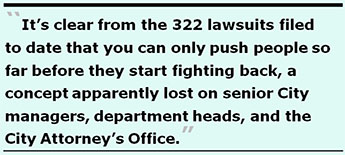 Between
41 cases settled to date, and 9 more still pending, the number
of wrongful termination cases since 2007 totals 50 cases.
Between
41 cases settled to date, and 9 more still pending, the number
of wrongful termination cases since 2007 totals 50 cases.
Of the $6.4 million paid to date to settle wrongful termination cases, fully $2.7 million of it — 42.1% — is attributed to just two of the 41 cases (Dr. Derek Kerr’s lawsuit against the Department of Public Health at $1.2 million between settlements and City Attorney fees, and Kelly O’Haire’s lawsuit against the Police Department at $1.5 million).
Of the nine pending wrongful termination lawsuits, Joanne Hoeper’s case against the City Attorney’s Office and City Attorney Dennis Herrera will more than likely be another million-and-a-half-dollars gone up in smoke.
Fifty wrongful termination lawsuits involve a lot of careers and lives damaged after being wrongfully fired, and suggests much of it may be likely due to retaliation by managers and City department heads who think they can get away with firing employees wrongfully.
However, because of the potential misclassification of lawsuits by the CAO, we may not have an accurate count of the total number of wrongful discharge and wrongful termination lawsuits filed by City employees.
It’s clear from the 322 lawsuits filed to date that you can only push people so far before they start fighting back, a concept apparently lost on senior City managers, department heads, and the City Attorney’s Office.
Majority of Lawsuits Filed By Employees in Just Five City Departments
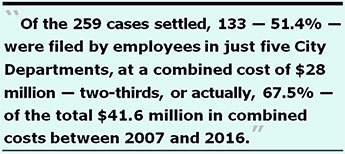 An
analysis of data provided by the City Attorney’s Office suggests
that five City Departments are responsible for a goodly chunk
of the prohibited personnel practice lawsuits, suggesting employees
in those Departments know how to lawyer-up, particularly those
in San Francisco’s Police Department.
An
analysis of data provided by the City Attorney’s Office suggests
that five City Departments are responsible for a goodly chunk
of the prohibited personnel practice lawsuits, suggesting employees
in those Departments know how to lawyer-up, particularly those
in San Francisco’s Police Department.
Public records requests to date have not previously requested which City Departments the lawsuits were filed against. But matching up employee names from five separate fiscal years of City Controller payroll data uncovered significant details. Of the 322 lawsuits filed to date — including pending cases — payroll records showed 237 of the cases could be matched to employee names to track which City Department they had worked for; the remaining 85 cases were researched on the Superior Court’s case information web site to determine City Department.
Table 2 shows that of the 259 lawsuits settled between 2007 and 2016, 221 were matched to payroll records or court records to determine the corresponding City Department. The 221 accounted for fully $39.8 million — 95.6% — of the total $41.6 million in lawsuit costs. The remaining 38 of the 259 settled cases that could not be matched to a corresponding City Department accounted for $1.6 million — 4.4% — of total settlement costs.
Table 2: Prohibited Personnel Practice Lawsuits, 2007 – 2016, Filed by City Employees, by City Department
[Click on Table for enlarged version.]
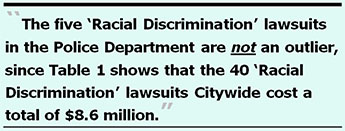 Of
the 259 cases settled, 133 — 51.4% — were filed by employees
in just five City Departments: The San Francisco Police Department,
the Department of Public Health, the Municipal Transportation
Agency, the Sheriff’s Department, and the San Francisco Fire
Department in descending order, at a combined cost of $28 million
— two-thirds, or actually, 67.5% — of the total $41.6
million in combined costs between 2007 and 2016.
Of
the 259 cases settled, 133 — 51.4% — were filed by employees
in just five City Departments: The San Francisco Police Department,
the Department of Public Health, the Municipal Transportation
Agency, the Sheriff’s Department, and the San Francisco Fire
Department in descending order, at a combined cost of $28 million
— two-thirds, or actually, 67.5% — of the total $41.6
million in combined costs between 2007 and 2016.
Some of the employee’s who filed lawsuits that were not identified by payroll records were not found on the Superior Court web site, including some that are blocked from public access viewing, for whatever reason, and are listed in Table 2 as “Unknown City Department,” “Lawsuit Not Found” or “Not Available,” or the City Department wasn’t named.
Digging in My Toes: A Closer Look at the Police Department
 Because
the 33 lawsuits filed by Police Department employees represented
just 12.7% of the total 259 cases settled to date — but consumed
fully 29.8% of the total costs — the Police Department deserves
a closer look. [Note: It is beyond the scope of this report
to analyze the type of cases filed by employees in each
of the 39 City Departments.]
Because
the 33 lawsuits filed by Police Department employees represented
just 12.7% of the total 259 cases settled to date — but consumed
fully 29.8% of the total costs — the Police Department deserves
a closer look. [Note: It is beyond the scope of this report
to analyze the type of cases filed by employees in each
of the 39 City Departments.]
Table 3: Prohibited Personnel Practice Lawsuits, 2007 – 2016, Filed by City Employees, Police Department Only
[Click on Table for enlarged version.]
Clearly, the City Attorney’s Office fought tooth-and-nail — spending nearly $3 million — to fight the “Other Actions by Employees Against the City” category, which accounted for well over one-third of the $12.4 million in total costs.
 But
what’s more shocking is that the “Racial Discrimination”
lawsuits resulted in the highest amount of City Attorney settlement
awards (at $1.7 million), and although they represented just 15.2%
of the lawsuits, those cases gobbled a quarter — 24.6% —
of the total costs to settle the 33 cases filed by SFPD employees
settled to date, with “Sexual Discrimination,” “Disability
Discrimination,” and “Wrongful Termination” not
far behind.
But
what’s more shocking is that the “Racial Discrimination”
lawsuits resulted in the highest amount of City Attorney settlement
awards (at $1.7 million), and although they represented just 15.2%
of the lawsuits, those cases gobbled a quarter — 24.6% —
of the total costs to settle the 33 cases filed by SFPD employees
settled to date, with “Sexual Discrimination,” “Disability
Discrimination,” and “Wrongful Termination” not
far behind.
This suggests not only that SFPD has a problem with racial and homophobic bias against members of the public, they have the same problem internally with its own employees.
The five “Racial Discrimination” lawsuits in the Police Department are not an outlier, since Table 1 shows that the 40 “Racial Discrimination” lawsuits Citywide cost a total of $8.6 million, and is the number one cause of lawsuits filed by City employees. Sadly, data isn’t available showing which ethnicities are being targeted for “Racial Discrimination.”
All of this suggests that this is precisely why the City’s Whistleblower Protection Ordinance needs to be amended, as the Civil Grand Jury recommended over a year ago.
Efforts to Strengthen the Whistleblower Protection Ordinance
 As
I wrote in July 2015, on June 8, 2015 San Francisco’s 2014–2015
Civil Grand Jury released its report “San Francisco’s Whistleblower
Protection Ordinance Is in Need of Change,” dated May
2015. The Grand Jury’s report was a damning indictment of
City Hall’s failure to adequately strengthen whistleblower
protections for City employees since directed to by voters in
2013 — now 13 years ago.
As
I wrote in July 2015, on June 8, 2015 San Francisco’s 2014–2015
Civil Grand Jury released its report “San Francisco’s Whistleblower
Protection Ordinance Is in Need of Change,” dated May
2015. The Grand Jury’s report was a damning indictment of
City Hall’s failure to adequately strengthen whistleblower
protections for City employees since directed to by voters in
2013 — now 13 years ago.
The Grand Jury noted that since 1989, the scope of San Francisco’s whistleblower protection laws had narrowed, providing weaker protections for City employees than for state and federal government employees. That narrowing, or shrinkage, of protections for City employees who blow the whistle had been no accident, but was driven by the “powers who be” who have tried valiantly to silence City employees for years.
Following the Grand Jury’s report, our Ethics Commission held two hearings (on January 20 and February 24, 2016) and forwarded recommendations to the Board of Supervisors to amend the Whistleblower Protection Ordinance (WPO).
Board president London Breed finally introduced legislation
on June 14 to amend the WPO, as the Grand Jury and Ethics Commission
recommended, which legislation will be heard by the Board’s
Rules Committee in late July or after the Board’s recess
in August. Breed’s amendments address most of the recommendations
made by the Friends of Ethics, which the Ethics Commission had
incorporated, including:
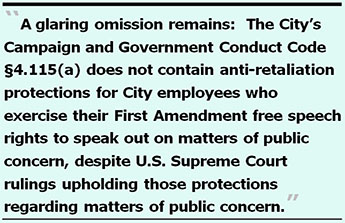 Increasing
civil penalties for City officers and employees who violate §4.115(a)
of the WPO from $5,000 to $10,000, for which they may be personally
liable in court proceedings.
Increasing
civil penalties for City officers and employees who violate §4.115(a)
of the WPO from $5,000 to $10,000, for which they may be personally
liable in court proceedings.President Breed should be thanked for introducing amendments to strengthen the WPO. However, Friends of Ethics is working to have additional recommendations incorporated into the legislation’s amendments.
Unfortunately, a glaring omission remains:
As I have written in the past, Federal Judge Claudia Wilken had noted in her September 6, 2012 Court Order keeping Dr. Kerr’s wrongful termination lawsuit alive, that San Francisco’s Campaign and Government Conduct Code §4.115(a) does not contain anti-retaliation protections for City employees who exercise their First Amendment free speech rights to speak out on matters of public concern, despite U.S. Supreme Court rulings that have consistently upheld that federal, state, and municipal employees absolutely have those First Amendment rights when it comes to issues of public concern.
The elephant in the room is this: Wilken had also noted in her Court Order that San Francisco’s current Sunshine Ordinance explicitly states in §67.22(d) that City employees absolutely are guaranteed these First Amendment protections when they speak on matters of public concern, which appears to have unfortunately escaped the attention of the 2014–2015 Civil Grand Jury, who mentioned nothing of this issue in its June 2015 report. The Sunshine Ordinance currently reads:
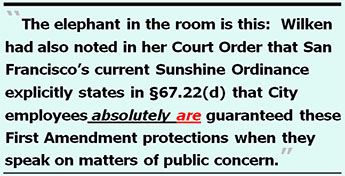 Those
protections need to be explicitly duplicated in Campaign and Government
Conduct Code §4.115(a).
Those
protections need to be explicitly duplicated in Campaign and Government
Conduct Code §4.115(a).
I have repeatedly testified to the Ethics Commission that this disconnect must be fixed, so that all 39,122 current full- and part-time City employees are finally afforded this anti-retaliation protection, but in the right City ordinance. I’ll continue to do so before the Board of Supervisors.
Retaliation “Tone” Set at the To
As I noted in July 2015, D. Jan Duffy — an expert witness Kelly O’Haire’s wrongful termination lawsuit against the Police Department — is correct in indicating that Mayor Lee had both a duty to ensure retaliation against whistleblowers is detected and remedied, and that organizations should set the tone from the top on down that retaliation is not acceptable and will not be tolerated. Unfortunately, all along Mayor Lee has also failed to set the appropriate tone regarding amendments to the Whistleblower Protection Ordinance.
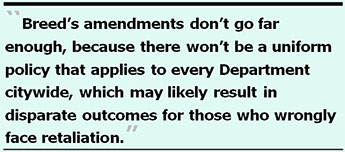 I
also noted in July 2015 that the WPO needs to have a provision
added specifying that any manager in every City department found
to have engaged in retaliation will face immediate suspension,
and in instances where a harmed individual prevails in civil court,
the manager(s) responsible for wrongful termination should themselves
face immediate termination.
I
also noted in July 2015 that the WPO needs to have a provision
added specifying that any manager in every City department found
to have engaged in retaliation will face immediate suspension,
and in instances where a harmed individual prevails in civil court,
the manager(s) responsible for wrongful termination should themselves
face immediate termination.
Unfortunately, the amendments advanced by Supervisor Breed do not fully incorporate a key provision recommended by Friends of Ethics, which had suggested specific penalties for City employees who wrongly retaliate against other City employees, such as a minimum two-week suspension without pay. Breed’s amendments do allow for administrative actions to be taken and a report on what was done, which is a step in the right direction to hold individuals accountable for their wrongful actions.
Breed’s amendments don’t go far enough, because there won’t be a uniform policy that applies to every Department citywide, which may likely result in disparate outcomes for those who wrongly face retaliation, since administrative actions may wildly vary across City departments.
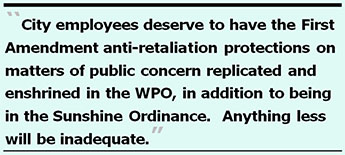 City
employees deserve to have the First Amendment anti-retaliation
protections on matters of public concern replicated and enshrined
in the WPO, in addition to being in the Sunshine Ordinance. Anything
less will be inadequate.
City
employees deserve to have the First Amendment anti-retaliation
protections on matters of public concern replicated and enshrined
in the WPO, in addition to being in the Sunshine Ordinance. Anything
less will be inadequate.
If the Whistleblower Protection Ordinance is fully amended and enhanced, it may well help reduce the amount of lawsuits filed against the City by City employees who wrongly face retaliation.
The savings could be in the millions of dollars, and should be pursued, if for no other reason than for the potential cost savings.
Monette-Shaw is an open-government accountability advocate, a patient advocate, and a member of California’s First Amendment Coalition. He received a James Madison Freedom of Information Award from the Society of Professional Journalists-Northern California Chapter in 2012. He can be contacted at monette-shaw@westsideobserver.
 Notes on the Data
Notes on the Data
Throughout this article, data presented was for the 103 lawsuits that were settled between January 1, 2007 to October 24, 2012 (a 5-year, 10-month period) vs. the 156 cases settled between October 25, 2012 and May 29, 2016, (a 4-year, 2-month period), irrespective of the date the lawsuits were actually filed. The surge in cases settled — from 103 to 156 — represents a 51.5% net increase in settlements concluded, comparing an almost six-year period to just over a four-year period.
There’s some telling data involved:
Number of Lawsuits Filed Per Year
Table A-1: Prohibited Personnel Practice Lawsuits Filed, 2007 – 2016, By Calendar Year
[Click on Table for enlarged version.]
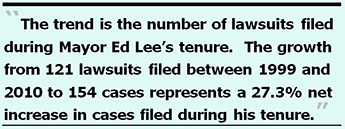 Table A-1 shows that
of the 103 lawsuits settled, many of them were first filed as
far back as 1999. While the number of cases filed after January
1, 2007 outpaced cases filed after October 25, 2012, the key trend
is the number of lawsuits filed during Mayor Ed Lee’s tenure
after he took office in January 2011. The growth from 121 lawsuits
filed between 1999 and 2010 — over a 12-year period —
to 154 cases filed in the 5.5-year period since January 2011 represents
a 27.3% net increase in cases filed during Lee’s tenure,
which is significant precisely because this involves a 12-year
period vs. a 5.5-year period. Lawsuits filed under Lee’s
"watch" are definitely going up!
Table A-1 shows that
of the 103 lawsuits settled, many of them were first filed as
far back as 1999. While the number of cases filed after January
1, 2007 outpaced cases filed after October 25, 2012, the key trend
is the number of lawsuits filed during Mayor Ed Lee’s tenure
after he took office in January 2011. The growth from 121 lawsuits
filed between 1999 and 2010 — over a 12-year period —
to 154 cases filed in the 5.5-year period since January 2011 represents
a 27.3% net increase in cases filed during Lee’s tenure,
which is significant precisely because this involves a 12-year
period vs. a 5.5-year period. Lawsuits filed under Lee’s
"watch" are definitely going up!
Sadly, data provided by the City Attorney’s Office failed to include the dates on which 47 — 14.6% — of the 322 lawsuits were filed, suggesting rotten recordkeeping by the CAO.
What About the Size-of-a-City-Department “Denominator”?
A reasonable person might suspect that the City Departments having the largest number of employees might result in more lawsuits being filed. But the correlation between size of a City Department and the number of prohibited personnel practice lawsuits filed appears to be a weak and tenuous correlation:
Table A-2: Prohibited Personnel Practice Lawsuits, 2007 – 2016, By Size of Department
[Click on Table for enlarged version.]
 For instance:
For instance:
From there, the correlations grow weaker:
And going from there, the ranking of settlement awards from
the CAO, ranking of settlement awards from the Board of Supervisors,
and ranking of City Attorney time and expenses trying to stop
the lawsuits are all over the map.